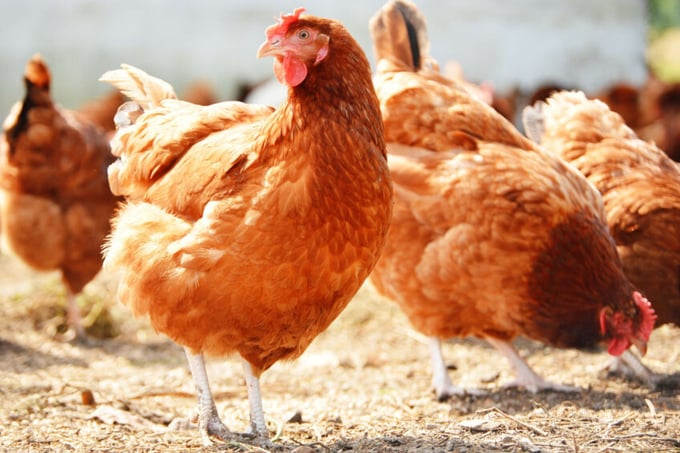June 20, 2025 | 12:52 GMT +7
June 20, 2025 | 12:52 GMT +7
Hotline: 0913.378.918
June 20, 2025 | 12:52 GMT +7
Hotline: 0913.378.918

Flox CEO Imtiaz Shams highlighted how intelligent technologies were making a real difference to poultry farmers to increase their productivity while promoting poultry welfare and sustainability. Photo: Canva.
Experts from the Centre for Research into Environmental Science and Technology (CREST) at the University of Chester are part of the FeedFlow initiative, led by insect farming innovator Flybox, which has been granted more than £3 million by Innovate UK from the Department for Environment, Food and Rural Affairs’ Farming Innovation Programme.
“Working alongside a phenomenal cohort of industry leaders and academic institutions, Flybox is confident that this project, which leverages advanced Artificial Intelligence and Black Soldier Fly (BSF) larvae, will deliver exceptional results to tackle challenges in health, welfare, and sustainability,” said Larry Kotch, CEO and co-founder of Flybox.
Welfare, productivity and sustainability
Partners also include UK poultry-tech start-up Flox, Nottingham Trent University, Courteenhall Farms, Menchine Farm, and Clarke Group Construction. The initiative integrates AI-powered monitoring, using Life Cycle Analysis and BSF larvae feed to enhance poultry welfare, optimise production efficiency, and promote more sustainable approaches in the poultry industry.
The FeedFlow project uses an AI-based platform designed to unify data streams from farms and processing factories by delivering real-time data on flock welfare and early warnings of potential issues. Alongside this, fortified BSF larvae delivers a nutrient boost that tackles health challenges, and the LCA, led by Jess Callaghan and Professor Julieanna Powell-Turner from the University of Chester, is assessing the global warming potential to prevent a race to the bottom in emissions.
Bridge poultry farming data with factory insights
CREST at the University of Chester has also been awarded a £1.5 million grant from the government’s Transforming Food Production Challenge fund, through Innovate UK, for the NetFLOX360 partnership project. The university is part of the NetFLOX360 consortium which, in line with the FeedFlow project, aims to ‘bridge poultry farming data with factory insights using AI for sustainable growth’. Led by FLOX, and the UK’s largest poultry producer, 2SFG (2 Sisters Food Group), NetFLOX360 will further develop the innovative, FLOX AI-based platform for large-scale poultry entities.
With the poultry supply chain currently hampered by a lack of real data across the entire value chain, Dr Kennedy Mutua at CREST said NetFLOX360 sought to fill this gap. It will enable the integration of algorithms into a cloud-based platform while engaging with poultry producers and processors, researchers, and policymakers, to provide a tool that offers easy access and informed decision-making based on real data.
Intelligent technologies
Imtiaz Shams, the CEO of Flox, highlighted how intelligent technologies were making a real difference to poultry farmers to increase their productivity while promoting poultry welfare and sustainability. He outlined how through the FLOX Machine Vision, real-time insights with producers and processors can be shared along the value chain through dashboards.
Prof Julieanna Powell-Turner, associate dean of Research and Innovation at the University of Chester, explained more about the importance of the projects. She said that despite advancements in production efficiency, the poultry industry faced persistent issues, including poor leg health, high mortality rates, and variable feed efficiency, while poultry production contributed notably to ammonia emissions in the UK. She outlined how it was recognised that UK production systems must evolve and the 2 projects and their forward-thinking approaches aimed to set new standards for welfare and efficiency in the industry.
Quantifying the benefit
Professor Emily Burton, director of the Safety and Sustainability Research Theme at Nottingham Trent University, added: “As the environmental cost of food production becomes of increasing concern to consumers, quantifying the impact of interventions via LCA analysis is becoming an essential tool in driving forward change: interventions usually cost money, so quantifying the benefit helps in decision-making.”
(PW)

(VAN) Poultry production in Poland, which has only started recovering from devastating bird flu outbreaks earlier this year, has been hit by a series of outbreaks of Newcastle disease, with the veterinary situation deteriorating rapidly.

(VAN) Extensive licensing requirements raise concerns about intellectual property theft.

(VAN) As of Friday, a salmonella outbreak linked to a California egg producer had sickened at least 79 people. Of the infected people, 21 hospitalizations were reported, U.S. health officials said.

(VAN) With the war ongoing, many Ukrainian farmers and rural farming families face limited access to their land due to mines and lack the financial resources to purchase needed agricultural inputs.

(VAN) Vikas Rambal has quietly built a $5 billion business empire in manufacturing, property and solar, and catapulted onto the Rich List.

(VAN) Available cropland now at less than five percent, according to latest geospatial assessment from FAO and UNOSAT.

(VAN) Alt Carbon has raised $12 million in a seed round as it plans to scale its carbon dioxide removal work in the South Asian nation.